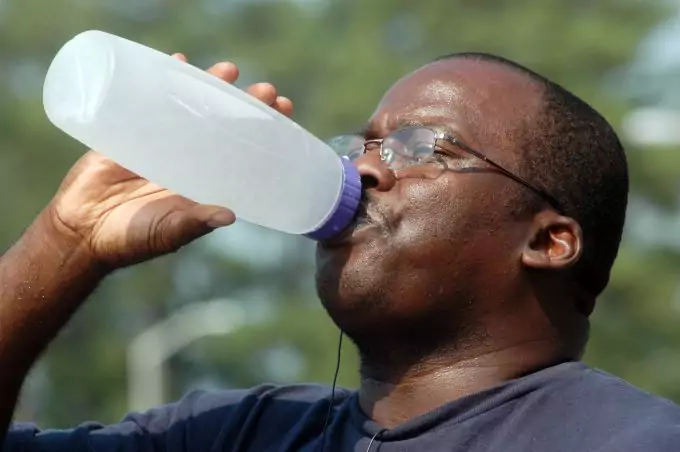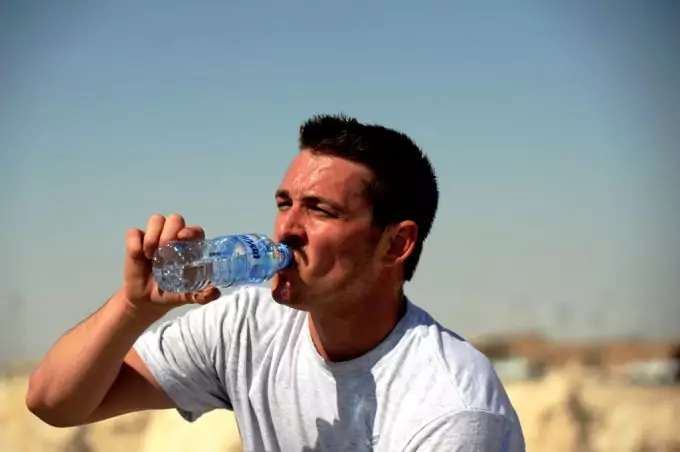Water intoxication, at first glance, seems to be a minor sickness. However, if left untreated, it can lead to coma and even death. Fatal cases of water intoxication are rare, but it’s vital to address symptoms early, especially in survival situations.
Dilutional hyponatremia is a physiological disturbance brought about by overhydration or drinking too much fluid in a short amount of time. This results in an imbalance of electrolytes and blood sodium.
Physicians recommend drinking several glasses of water per day to help maintain good health and prevent disease, but in this case, too much of a good thing can be dangerous.
Table of contents
Causes of Water Intoxication
Our body controls our hydration status through sensations of thirst. If we are overhydrated, our kidneys will remove extra fluid, and we will not feel thirsty.
If we are dehydrated, we will begin to feel thirst. Sodium in the bloodstream is affected most by water intake and excretion from the kidneys.

Essentially, water intoxication can stem from two types of overhydration:
- Increased fluid intake
- Excessive fluid retention. Fluid retention is often a signal of a more serious medical condition.
See also: Water Poisoning: How to Detect Hyponatremia + Treatments List.
The total volume of water present during intoxication can help identify which type of water intoxication has affected the patient.
Risk Factors
Like many medical conditions, dilutional hyponatremia can be a result of one or several factors.
- Overexertion
- Psychological Conditions
- Medication
- Physiological conditions
Overexertion
- Endurance athletes are prone to water intoxication after grueling exercise or during extreme conditions. If a rehydration plan is not followed, some athletes will overconsume plain water without replacing electrolytes, leading to an imbalance of fluid and sodium.
- People working in extreme conditions are also suscpetible to dilutional hyponatremia.
Psychological Conditions
- Some psychiatric conditions, like schizophrenia, often compel the patient to drink more fluids than they normally would.
- Psychological stress can cause compulsive water intake, increasing the risk of water intoxication.
Medication
Some medications used to treat anxiety and depression, diarrhea, colds, and asthma have a lingering side effect called “dry mouth.” This condition restricts saliva from flowing freely, dries the mouth, and causes the patient to drink excessively.
Physiological conditions
- Low body mass is also a risk factor for water intoxication, as someone with less body mass does not have the ability to take on extra fluids.
Medical Conditions
Some medical conditions cause excessive fluid retention.
These conditions include the following:
SIADH
SIADH is short for “Syndrome of Inappropriate Anti-Diuretic Hormone.” This condition is often characterized as the abnormal secretion of an anti-diuretic hormone. Anti-diuretic hormones regulate the retention of water by increasing reabsorption within the kidneys.
Liver Disease
Cirrhosis of the liver is often diagnosed with increased fluid retention or edema.
Kidney Problems
Kidneys are responsible for waste removal from the body. If the kidneys are not functioning correctly, the body will retain waste and fluid. Good urine output is essential for fluid and electrolyte balance.
Hormonal Imbalance
Some hormonal diseases such as Addison’s disease and hypothyroidism have been linked with low sodium levels.
Recreational Substances
- Drugs. The party drug ecstasy, or MDMA, can cause users to overexert themselves and perspire heavily. MDMA can also alter anti-diuretic hormone levels in the body, preventing excess water from being released through urine. These factors, combined with continuous water consumption to relieve thirst, can cause fluid imbalance.
- Beer. Alcoholics who consume excess beer can be at risk for dilutional hyponatremia. Beer contains a very small amount of sodium, and if combined with an unhealthy diet, can result in rapid sodium loss resulting in hyponatremia.
Signs of Water Intoxication
There are several telltale signs to watch out for in detecting water intoxication.

Watch out for these symptoms:
- Swelling – a person suffering from water intoxication will sometimes have swollen toes and fingers. The digits will be clammy to the touch and will have a water-balloon-like consistency.
- Clear urine – the color of a person will normal fluid levels will range from light yellow to light orange. Clear urine is an indication that you have consumed too much water and need to cut back.
- A significant change in body weight – rapid changes in body weight can signal that fluid is being retained.
- Dry or sweaty skin – a person suffering from water intoxication will sometimes have dry or sweaty skin.
Early Symptoms of Water Intoxication
Drinking too many fluids in a short period of time will reduce the amount of sodium in the blood, resulting in the following symptoms:

Early-stage – water intoxication at this stage cannot easily be detected, but early symptoms include:
- Nausea and vomiting – mild cases don’t often lead to vomiting.
- Disorientation and confusion – low blood sodium levels will result in low blood volume, which directly affects our brain functions.
- Headache – the increase of fluids in the blood cells dilute the plasma. Once the diluted blood reaches the brain, it can cause mild to severe headaches.
- Restlessness – patients suffering from water intoxication will have discomfort, especially when sitting down, as the fluids around the cells will cause bloating.
- Fatigue – patients with water intoxication will feel an overall sense of weakness, sometimes combined with restlessness.
Advanced Wymptoms of Water Intoxication
Advanced stage – left untreated, water intoxication will further affect sodium levels in our blood and manifest itself through:
- Muscle spasms, weakness, and cramps – as the electrolyte levels in our body go down, we will experience muscle spasms, jolting cramps, and weakness.
- Slurred speech
- Diarrhea – this symptom further exacerbates the electrolyte imbalance as essential fluids are excreted unnecessarily.
- Unconsciousness – advanced stage depletion of blood sodium will lead to loss of consciousness.
- Seizures
Complications of Water Intoxication
Water intoxication, when untreated for more than 1 or 2 days, can result in the following complications:
Comatose – patients already unconscious can succumb to coma if the primary cause is not identified and the necessary treatment is not given.

Retardation – an infrequent complication; mental retardation can also result from water intoxication if the condition is severe.
Death – is the final complication. Several cases have been documented.
Similarities to Heat Exhaustion
The symptoms of water intoxication listed above are similar to those related to heatstroke. Therefore, some experts argue that water intoxication is a type of heat illness. However, given that the symptoms of water intoxication are the same as heat exhaustion, it is often hard to determine what is affecting the patient.
Heat exhaustion is often complicated by hyponatremia, caused by excessive sweating and the inability to consume adequate electrolytes. The symptoms are similar to Dilutional Hyponatremia (aka water intoxication).
Differentiation
The similarities between heat exhaustion and water intoxication complicate proper diagnosis without consulting a Doctor. Laboratory tests are required to diagnose the patient correctly. In addition, reviewing the history of events leading to the illness can help determine intoxication or exhaustion.

If a patient suffers from one or more of the risk factors in this article, they may have suffered intoxication. However, there are still some symptoms present in heat exhaustion that doesn’t match water intoxication. These include fainting, pale skin, profuse sweating, and a rapid heartbeat.
Preventing Water Intoxication
There are several tips to keep in mind if you are concerned about water intoxication.
Endurance Athletes
For endurance athletes, its essential to:
- Adequately replace fluids – before, during, and after a workout. Take time to understand your sweat volume by weighing yourself before and after your event.
- Track your fluid intake
- Eat salt – or drink fluids with sodium content to replace salt lost via sweat.
- Rest – beginners should take advantage of any rest stop available, especially in high temperatures. It is important to rest and cool down your body.
Survivalists and Outdoors People
- Prepare for the worst – basic mountaineering dictates that mountaineers should always be ready for anything that could happen; this includes the sudden onset of disease and injury.
- Plan Ahead – Take into consideration the area you will be traveling into and identify water sources, weather and terrain.
- Trail food – prepare trail food that has a healthy balance of sugar and sodium to prevent both low sodium and low sugar levels.
- Rehydration salts – a well-prepared outdoors person will carry rehydration salts to help recover from Hyponatremia. Check out our top picks for the best safe and affordable hydration drinks for more choices.
Medically at Risk for Water Intoxication
People with existing medical conditions should consult with their physicians before undertaking any task that requires more effort than usual.
First Aid and Water Intoxication Treatment
First Aid
It’s crucial you treat water intoxication quickly.
- Keep the person calm – as with any injury or illness, it is essential to keep the patient calm. Sit them in a cool, dry place and make sure they are comfortable.
- Fluid restriction – make sure the patient has limited access to water and any other type of liquid.
- Salty food – if the patient feels the need to eat, give them food with a high salt content. This will increase their sodium levels once the salt is absorbed by the body.
- Medication – providing patients with medication can sometimes backfire, especially without proper training and information. Some generic medicines like aspirin and ibuprofen often cause an adverse reaction instead of alleviating the symptoms.
- Call an ambulance – immediately call an ambulance once you realize that someone is suffering from symptoms of water intoxication.
Treatment
Treatment for mild water intoxication usually involves restricting fluids. Once professional care is introduced, the following are some of the steps taken to treat acute or severe cases:
- Medication – diuretics are often administered to increase urination, thus lowering the volume of fluids present in the body. Some medications are also given to reduce persistent symptoms and treat the underlying medical cause of water intoxication.
- Consultation – continuous consultation with your physician is needed to ensure that there is no permanent complication resulting from water intoxication. Maintenance medication may also be provided as needed.
Water intoxication is not as simple as it sounds. However, knowing how much water to drink each day is important, and below are some general guidelines.

Understanding water intoxication symptoms and knowing how to treat them is important.
Learn more about the symptoms and treatments for overhydration here.






I find the infographic to be helpful but I feel that it should only be used as a guide – we all have varying needs when it comes to fluid intake. Others can do with just 8 glasses while some would require a little more than. I myself consume at least 10 per day, more if it’s particularly hot. I guess it depends on where you are located, your lifestyle, your activity for the day and the climate. A lot of variables but eight glasses is the benchmark.
You are right, the fluid intake needs vary from one person to another. However, the 8 glasses is an average that anyone should at least consider.
So water intoxication is drinking too much water; your kidney is functioning but is overwhelmed, thus, you overcome your kidney’s ability to dilute urine? I always thought drinking more than 10 glasses of water is good, but it isn’t safe after all. What if I am living in a hot climate and was always thirsty? Do I need to retain myself from drinking more than 10 glasses a day?
It’s not just the fact that your kidney is overwhelmed.
Due to Osmosis cells absorb higher quantities of water when more is consumed.
To balance out higher water consumption more salt/ electrolytes should be consumed (as mentioned in the article) otherwise cells in your body will burst.
If you’re living in an area with a hot climate, it is okay to drink more than 10 glasses of water since you do get to sweat most of the water out.